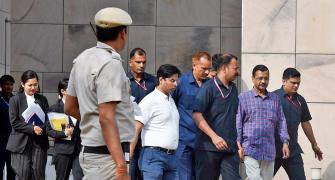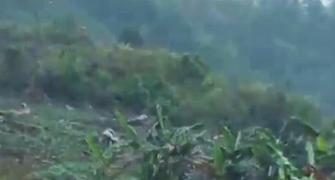The New York Democrat, and former co-chair of the Congressional Caucus on India and Indian Americans, said that in this regard, the US-India counter-terrorism cooperation increase should be "both in frequency of consultation and depth of content."
Ackerman, who was chairing a hearing he had convened on 'Building a Strategic Partnership: US-India Relations in the Wake of Mumbai,' noted that the Chairman of the US Joint Chiefs of Staff Admiral Mike Mullen had recently been in India "and reiterated the US military's commitment to work with his Indian counterparts to combat terrorism."
"That a welcome signal," the lawmaker said, "but it's time to stop simply issuing statement and to start actually cooperating."
Ackerman bemoaned that while the United States and India "have had a joint counter-terrorism working group since 2000, the group has only met 9 times."
He said that while annual meetings "are nice, more frequent and substantive meetings would be better," and in this regard, suggested that Washington and New Delhi "establish a senior-level strategic dialogue that occurs several times a year," on the lines of the strategic dialogue between former Deputy Secretary of State Strobe Talbott in the Clinton Administration and erstwhile External Affairs Minister Jaswant Singh during the Atal Bihari Vajpayee government, that resurrected the relationship after it was in the doldrums and India was slapped with sanctions following the May 1998 Pokhran nuclear explosions.
Ackerman was quick to note that "I don't mean that there should be a special envoy for India or that such talks should be issue specific, but I believe that regularized conversations between the most senior levels of both governments on the broad range of global issues where we have common interests will lay the foundation for the 'strategic partnership' that everyone professes to want, but has thus far proved elusive."
He said that "over the last decade, and particularly since the 2005 Joint Statement," during the visit to Prime Minister Manmohan Singh
to Washington, "the United States and India have established channels both governmental and in conjunction with the private sector to discuss energy, trade, agriculture, health care, and high technology issues."
But Ackerman argued that while these dialogues have proven useful, they were however "insufficient." He said, 'our discussions in both the Trade Policy Group and Agricultural Knowledge Initiative were unable to prevent India and the United States from being on opposite sides during the Doha Round of the World Trade Organization negotiations."
Ackerman said that "with regular senior level dialogue, both nations would have had a better understanding of the other's concern: ours about open markets for agricultural goods; India's about how to protect the livelihood of small farmers in a competitive global economy."
"It seems to me that the US-India Trade Policy Forum was either the wrong address or insufficiently senior enough to address the political and social issues that accompany any serious discussions about the expansion on free trade," he said.
Ackerman also complained that "both nations are also talking past each other on the climate change debate," and said, as with counter-terrorism, trade and other issues, the climate change issue "is also an issue of sufficient size and complexity to warrant frequent discussion at the most senior levels of both governments."
He said that "regional security issues would also benefit from such discussions," and said in particular, "divergent views on how to deal with the challenge posed by Iran, have, in the past, been the cause for some friction."
Ackerman said that with the Obama Administration in the midst of a policy review and having just appointed a new Special Adviser for Southwest Asia, "it is my hope that, whatever new strategy is developed, India will have been consulted early in the process."
"Any strategy addressing Iran's nuclear ambitions needs to be supported by a broad international coalition and India, based on both its interests and its values, should be part of that coalition," he emphasized.
Ackerman said it's about time to "retire the cliche" of shared values "of the world's oldest and the world's largest democracies," and instead, "both nations roll up their respective sleeves and get to work on the substance of which true strategic partnerships are made--not bland agreements in principle, but binding commitments based on serious understandings about respective national priorities."







